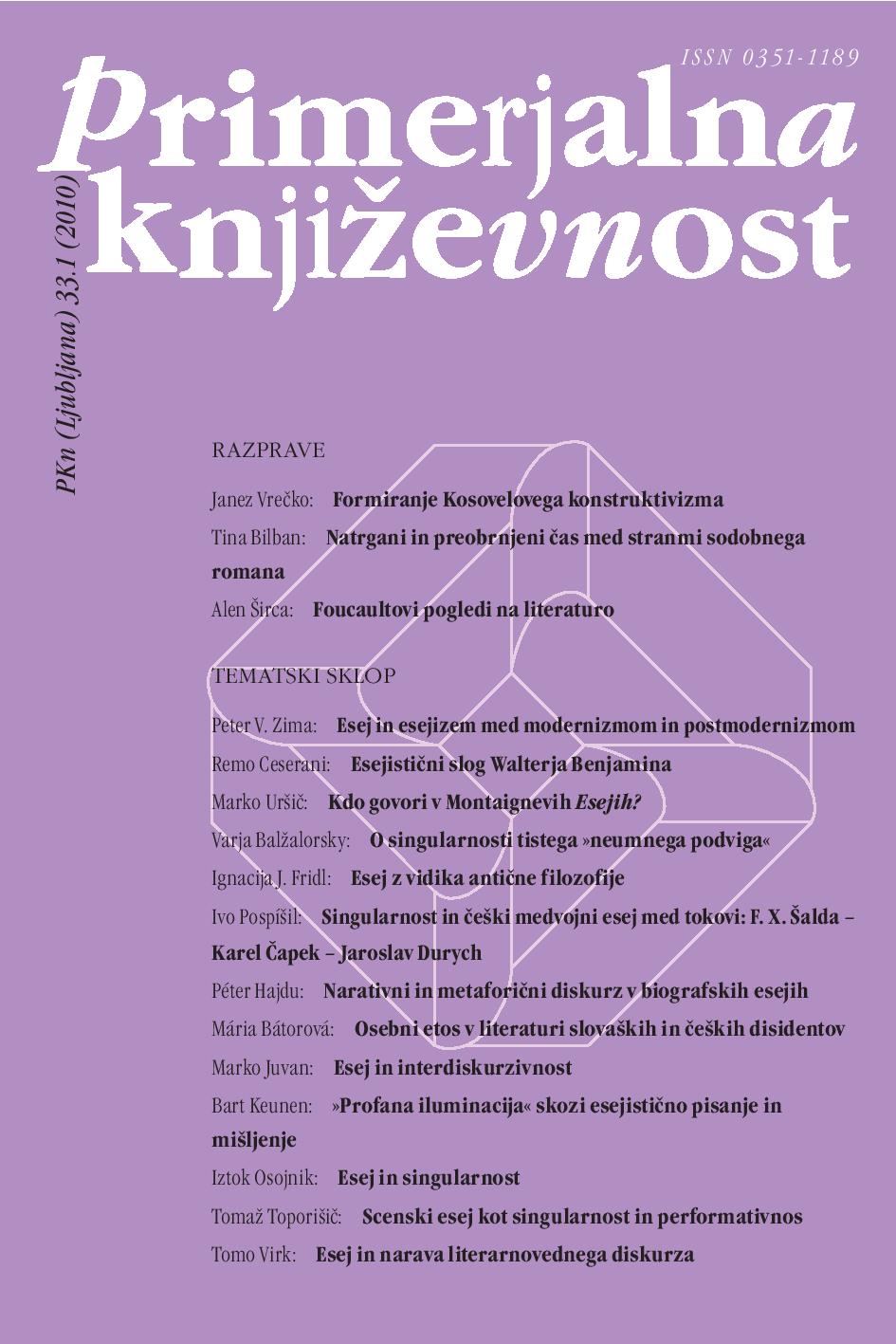Profane Illumination Through Essayistic Writing and Thinking. Benjamin and Bakhtin on the Value of Everyday Experience
Keywords:
literary theory, essay, Benjamin, Walter, illumination, Bakhtin, Mikhail, prosaicsAbstract
This article points at the contrast between the empty concept of experience that was introduced by Enlightenment thinkers and the “essayistic” way of redeeming experience that can be traced back from Erasmus to Perec. The argument links the theory of everydayness of Lefèbvre with Benjamin’s concept of “illumination” and with Bakhtin’s ideal of a “prosaics”.References
Agamben, Giorgio. Infancy and History. On the Destruction of Experience. London–New York: Verso, 2007 (1978).
Badiou, Alain. “Philosophie du faune”. Petit manuel d’inesthétique. Paris: Seuil, 1998. 189–215.
Bakhtin, Mikhail M. “The Bildungsroman and Its Significance in the History of Realism”. Speech Genres and Other Late Essays. Ed. Caryl Emerson and Michael Holquist. Austin: University of Texas Press, 1986 (1937). 10–59.
– – –. “Forms of Time and of the Chronotope in the Novel: Notes Toward a Historical Poetics”. The Dialogic Imagination. Ed. Michael Holquist. Austin: University of Texas Press, 1981 (1937). 84–254.
– – –. Toward a Philosophy of the Act. Ed. Michael Holquist. Austin: University of Texas Press, 1993 (1919).
Baudelaire, Charles. Le Spleen de Paris. Petits poèmes en prose. Paris: Colin, 1958 (1869).
Benjamin, Walter. The Origin of German Tragic Drama. Trans. John Osborne. London: Verso, 2003.
– – –. “Der Surrealismus. Die letzte Momentaufnahme der europäischen Intelligenz”. Angelus Novus. Frankfurt am Main: Suhrkamp, 1966 (1929). 200–215.Translation online: <http://www.generation-online.org/c/fcsurrealism.htm> (Access 15.01.2010).
Benjamin, Walter. Gesammelte Schriften I (3 vol.). Ed. Rolf Tiedemann. Frankfurt am Main: Suhrkamp, 1974.
– – –. Selected Writings III. 1935–1938. Ed. Michael W. Jennings. Cambridge, Ca: Harvard UP, 2002.
Bergson, Henri. “Time and Free Will. An Essay on the Immediate Data of Consciousness”. Trans. F.L. Pogson. New York: Macmillan, 1910 (1889). <http://www.archive.org/stream/timeandfreewilla00berguoft/timeandfreewilla00berguoft_djvu.txt> (Access 15.01.2010).
Cassirer, Ernst. The Philosophy of Symbolic Forms II. Mythical Thought. New Haven: Yale UP, 1975 (1925).
Coetzee, J. M. “De observerendeblik van Walter Benjamin”. Filosofie Magazine 10.3 (2001). Originally published as J. M. Coetzee. “The Marvels of Walter Benjamin”. The New York Review of Books 48.1 (11 January 2011). <http://www.nybooks.com/nyrev/WWWfeatdisplay.cgi?20010111028R> (Access 15.01.2010).
Elias, Norbert. Het civilisatieproces. Utrecht: Het Spectrum, 1982 (1939).
Erasmus, Desiderius. The Praise of Folly (1509). Gutenberg Project. <http://ia331303.us.archive.org/1/items/thepraiseoffolly09371gut/7efly10.txt> (Access 15.01.2010).
Lefèbvre, Henri. Critique of Everyday Life. Trans. John Moore. London: Verso, 2002 (1961).
Morson, Gary Saul and Caryl Emerson. Mikhail Bakhtin: Creation of a Prosaics. Stanford: Stanford UP, 1990.
Morson, Gary Saul. Narrative and Freedom: The Shadows of Time. New Haven: Yale UP, 1994.
Morson, Gary Saul. “Prosaics Evolving”. The Slavic and East European Journal 41.1 (Spring 1997): 57–73.
Morson, Gary Saul. “Contingency and Freedom, Prosaics and Process”. New Literary History 29.4 (Autumn 1998): 673–686.
Shilling, Derek. “French Sociologies of the Quotidian: From Dialectical Marxism to the Anthropology of Everyday Practice”. Encountering the Everyday: An Introduction to the Sociologies of the Unnoticed. Ed. Michael Hviid Jacobsen. Houndmills, Basingstoke / New York: Palgrave Macmillan, 2009. 187–210.


